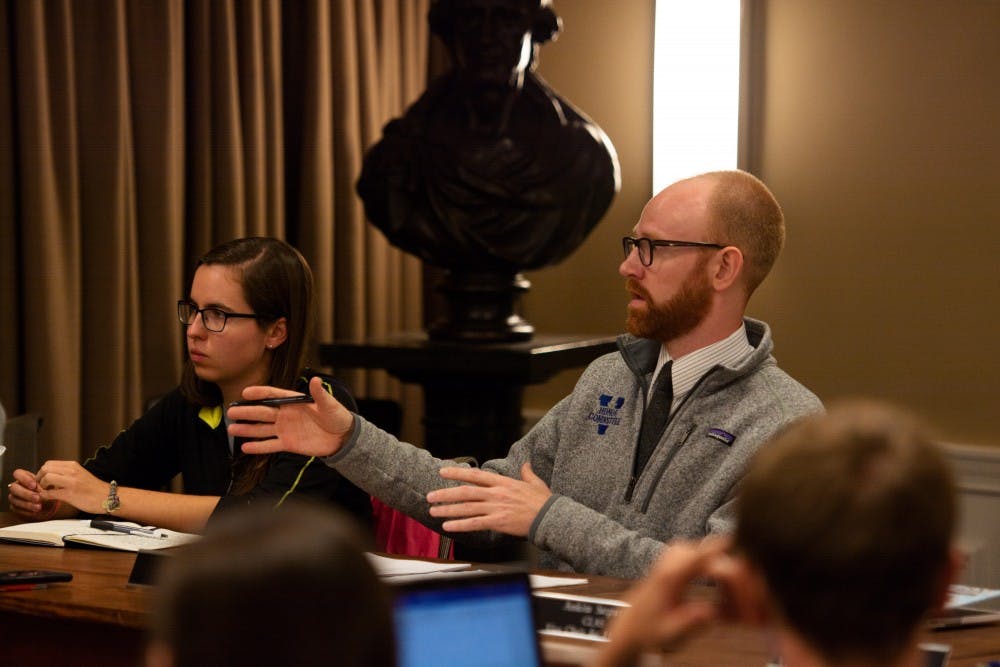The Honor Committee met Sunday to continue discussion on possible changes to the Contributory Mental Disorder, or CMD policy. Honor’s Policies and Procedures Committee was authorized through an informal vote to draft possible changes to the Committee’s bylaws, with a possible vote on the proposals to be held at its general body meeting next Sunday.
At its meeting last week, the Committee debated making a number of changes to the current CMD policy — including the removal of a student’s right to appeal a CMD decision, creating more explicit timelines for CMD requirements to be met and removing the admission of guilt policy currently required to obtain a CMD.
The CMD is a procedure that allows students to request a psychological evaluation prior to moving through Honor proceedings to determine if a mental health condition contributed to the commission of the offense, which is typically overseen by the Office of the Dean of Students and conducted by Student Health or the University’s Counseling and Psychological Services.
As the process currently stands, students must admit to an Honor offense to obtain a CMD hearing. The most recently proposed change would no longer require students to admit to an offense before a CMD hearing.
Ory Streeter, Honor Committee Chair and a Medical student, said he would like to see changes to the current CMD policy carried out sooner rather than later.
“We have a strategy I would like to propose to you all to move forward,” he said. “We don’t want the psychological hearing reform to dominate our time this semester.” A psychological hearing is the same process as a CMD.
Streeter put forward three motions addressing the three main points of debate from the previous meeting.
According to Streeter, the changes would be written with a “sunset clause” to appease potential opposition in the Committee. After an initial vote is held, the sunset clause would require the Committee to vote again on the changes at the end of the semester. If the Committee failed to pass the changes, the bylaws would revert back to their previous form.
Jeffrey Warren, a College alumnus and former vice chair for hearings presented a review of the CMD to the Committee in September 2017, beginning the most recent push to reform CMD procedures.
In particular, Warren proposed altering the timeframe in which a student can request a CMD hearing until only after the case goes through an investigative panel. Currently, a student can take a CMD at any point up until 10 days after the investigative panel.
Streeter’s first proposed change is about the timetable students have to request a CMD evaluation. The Committee debated last week over whether the current 45 day period for students to see a doctor is too restrictive.
Streeter proposed “giving the Dean of Students the ability to restrict students to 45 days”, but added that ODOS may be allowed to grant extensions as needed. This would in theory move the process along, but still allow students time to make appointments and deal with delays.
Forcing students to act within the deadline might help move the process along, but Andrew McCartney, a Curry graduate student and representative, had reservations.
“Putting restrictions on the student who may or may not have a disability doesn’t move us towards the goal of this legislation,” McCartney said, adding that obtaining an appointment at CAPS can be a six-week process.
One of the Committee’s primary goals in changing the process is to make the process of acquiring a CMD easier and more accessible for students who need it.
Peyton Sandroni, a fourth-year Engineering student and vice chair for investigations, was in favor of making the process faster.
“As it stands right now, a CMD just disappears, and we don’t hear about it for years,” Sandroni said.
Streeter’s second proposal is to move the initiation of a CMD process to after an investigation panel has completed its ruling. Currently, a student can move into the CMD process before an investigation is complete, meaning there is less information for the CMD decision to be based on. The change would in theory mean that the CMD process would have all the information available for consideration.
Streeter said a possible side effect of this change would be eliminating the need for a CMD altogether.
“Anecdotally, we know that [the] I [Investigations] panel dismisses some cases,” Streeter said. “[It] may save CMD some unneeded effort.”
Besides possibly dismissing the case, proponents of the change highlighted the need for more information during the CMD process.
“Dean Groves [the Dean of Students] is the barrier or gatekeeper to a psychological hearing, so he needs to have substantial documentation,” said Stearns Swetnam, a fourth-year College student and alternative sanctioning working group co-chair.
Finally, the third proposed change removes the requirement for students to admit guilt before entering the CMD process. This change, combined with moving the CMD process until after an investigation is complete, would give students the fairest possible consideration according to proponents of the change.
Currently, CMD procedures can be modified by Honor, but are conducted externally by the Office of the Dean of Students.
Debate on the proposed changes will resume next Sunday, with a possible vote on changing the bylaws.







